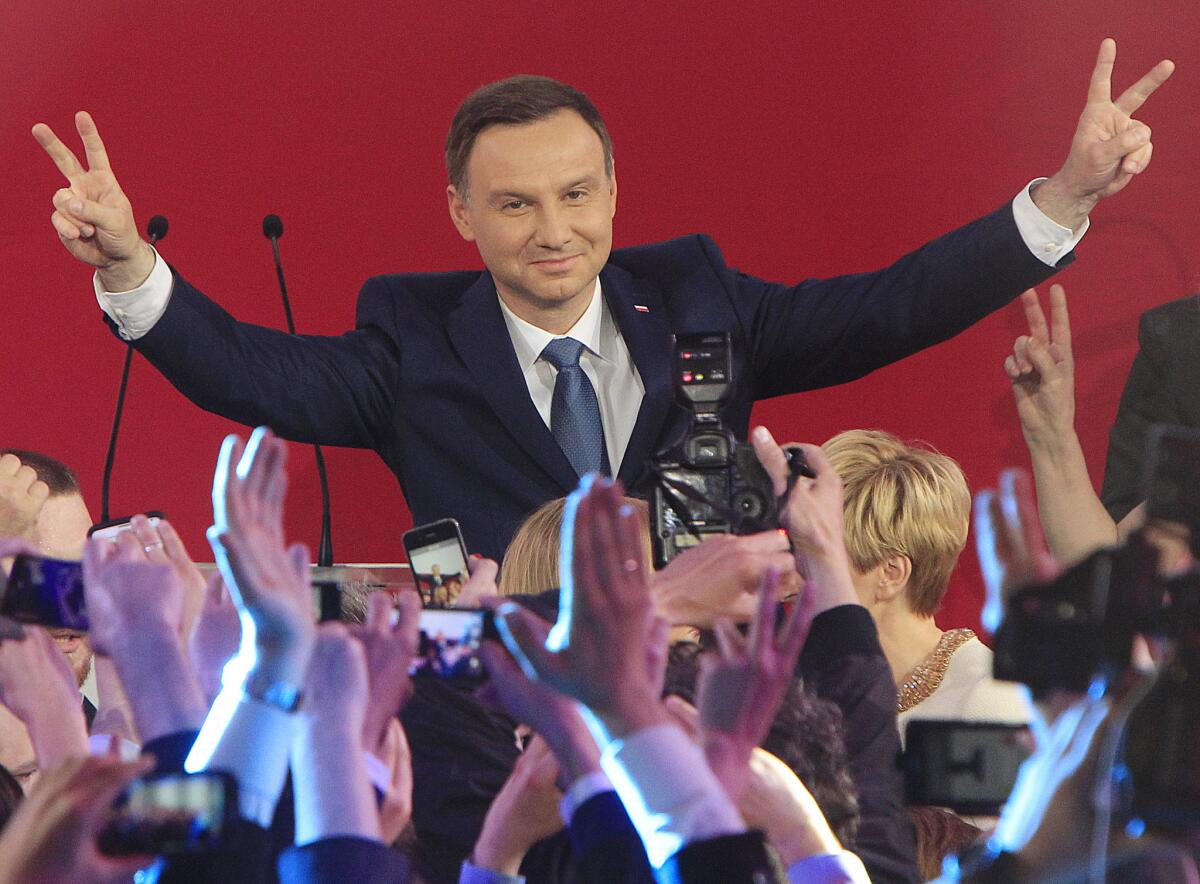Conservative’s win of Polish presidency likely to boost party this fall

Opposition candidate Andrzej Duda celebrates with supporters his victory as first exit polls in the presidential runoff voting are announced in Warsaw on May 24.
- Share via
The old and the young joined forces in Poland to hand a surprising victory to conservative populist Andrzej Duda, whose presidential campaign promises included rolling back the retirement age and wresting control of domestic economic matters from the European Union.
Duda’s election victory, announced Monday, is expected to boost the chances for his Law and Justice Party to best the ruling liberals of Civic Platform during parliamentary elections in October, restoring the conservatives’ control of both the legislature and executive office for the first time in nearly a decade.
Duda, 43, a former deputy justice minister when his party last came to power in 2005, has voted with the right-wing faction of the European Parliament since his election to the continental body last year, taking sides with British colleagues opposed to broader authority of the 28-member European Union over member states’ national affairs.
The president-elect, who will take office Aug. 6, has said Poland will not adopt the euro common currency until the 19-nation Eurozone resolves its debt problems and “so long as the standard of living of Poles remains below that of the Germans or the Dutch.”
Poland has enjoyed healthy economic growth in recent years, while most European Union states have struggled through recession. The country of 38 million is on track to see its economy expand by 3.5% this year.
But the gains have been unevenly distributed, with older Poles left out of the business boom of the last two decades and the young comprising a disproportionately large share of the country’s more than 11% unemployment.
“Those who voted for me voted for change,” Duda told his cheering supporters after exit polls showed late Sunday night that he had defeated incumbent President Bronislaw Komorowski 52% to 48% in the day’s balloting.
On the campaign trail, Duda promised to assert more national control over banks and drop the retirement age, which was raised to 67 by Civic Platform, to 65. He also called for abolishing income tax for the lowest wage-earners, raising rates for banks and for denominating Poles’ home mortgage loans in zlotys rather than Swiss francs, as has been the practice in the post-communist era. Those measures, if adopted, could cost the government $67 billion, Britain’s Financial Times calculated.
Poland’s presidency is largely ceremonial. However, unlike most other European parliamentary democracies, the nation’s head of state serves as commander-in-chief. The president also has the right to propose legislation, veto bills passed by the Sejm and to appoint the country’s central bank chief.
The prospect of populist measures being pursued under Duda’s leadership sent the zloty and Polish banking stocks on a tumble Monday.
“High probability of significant changes on the political scene after the autumn parliamentary elections suggest higher political risk and uncertainty concerning the shape of fiscal and monetary policy in medium term,” Credit Agricole bank wrote Monday of the election results.
Duda, a former choirboy whose social policies hew closely to those of the Vatican, drew congratulations on his victory from the Roman Catholic Church. A devout Catholic, Duda opposes abortion and in vitro fertilization.
The president-elect’s stated intent to focus on Poland’s domestic affairs prompted Russian President Vladimir Putin to send a congratulatory telegram, professing “certainty that building a constructive relationship between Russia and Poland, based on the principles of genuine good neighborhood and respect for each others’ interests, would foster stronger security and stability.”
Poland’s Civic Platform leaders have been highly critical of Russia’s seizure last year of Ukraine’s Crimea peninsula and its clandestine support of the pro-Russia separatists in eastern Ukraine. But Duda’s posture toward Russia appears to be as defiant as that of the current liberal government. He called on the campaign trail for the United States and NATO to station troops on Poland’s eastern border to deter any further threats from Russia.
Nevertheless, Russian media analysts contended that Duda’s election signaled a widening rift between Poland and Ukraine.
“The election of Andrzej Duda ... will change Poland’s role of being Ukraine’s advocate in Europe,” Ruslan Bortnik, director of the Ukrainian Institute of Policy Analysis and Management, told Tass.
The news agency pointed out that Duda, unlike current Polish government officials, has been outspokenly critical of Ukrainian politicians’ attempts to cast the World War II-era Ukraine Insurgent Army as anti-Soviet liberators, with no acknowledgement of its massacres of Poles in Volhynia and Eastern Galicia.
Follow @cjwilliamslat for the latest international news 24/7
More to Read
Sign up for Essential California
The most important California stories and recommendations in your inbox every morning.
You may occasionally receive promotional content from the Los Angeles Times.











